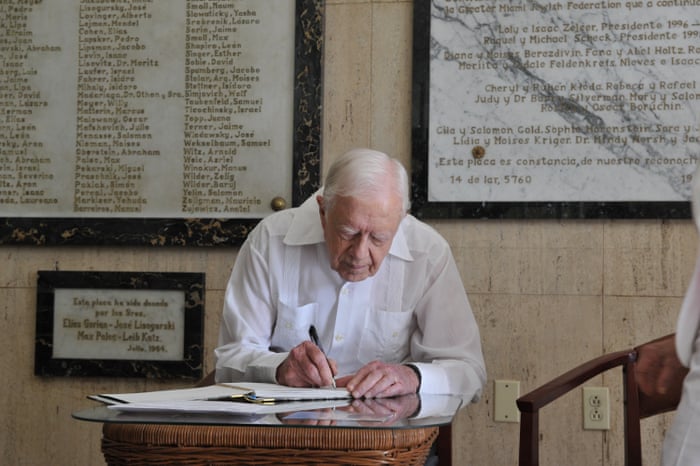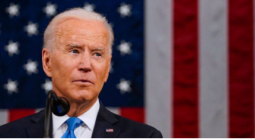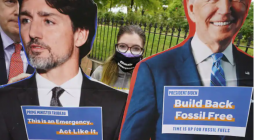‘Decades ahead of his time’: history catches up with visionary Jimmy Carter
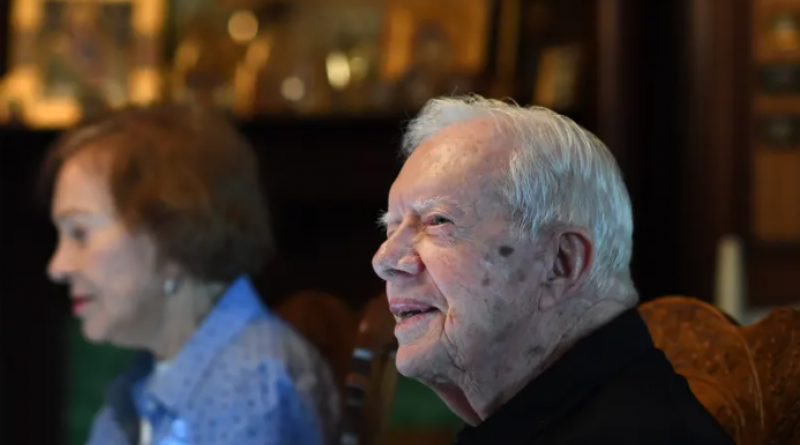
A new film rejects the popular narrative and recasts the former president, 96, as hugely prescient thinker, particularly on climate change
When I reach Jimmy Carter’s grandson by Zoom, he answers wearing a Raphael Warnock campaign T-shirt. Jason Carter is a lawyer and politician himself, mid-40s, animated and well-read, with blue eyes reminiscent of his grandfather’s. He’s just got off the phone with his 93-year-old grandmother, Rosalynn. It’s a special day; Joe Biden is on his way to the Carter house in Plains, Georgia.
“My grandfather has met nearly everyone in the world he might want to,” Jason Carter says. “Right now, he’s meeting with the president of the United States. But the person he’d say he learned the most from was Rachel Clark, an illiterate sharecropper who lived on his family’s farm.
“He didn’t pity her,” Carter says. “He saw her power. My grandfather believes in the power of a single human and a small community. Protect people’s freedoms, he says, and they can do great things. It all comes back to an enormous respect for human beings.”
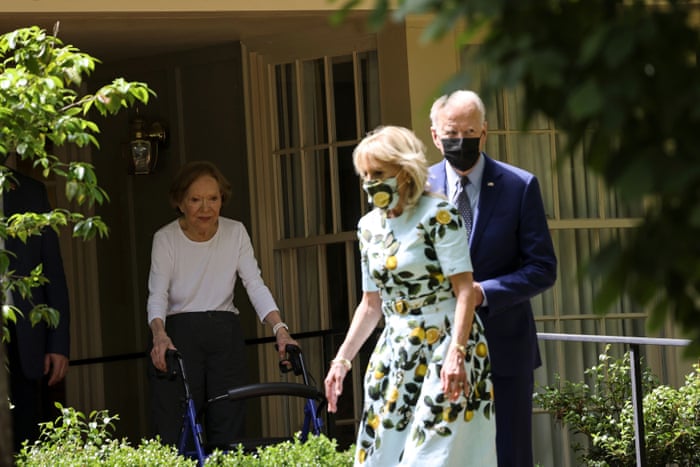
Carter is openly moved speaking about his grandfather, though it’s also clear he does so often. A spate of recent biographies and documentaries shows not just a renewed interest in the former president, but a willingness to update the public narrative surrounding his time in office. Recent biographer Jonathan Alter calls Carter “perhaps the most misunderstood president in American history”.
Carter, who lost his bid for re-election in a so-called landslide to Reagan in 1980, is often painted as a “failed president” – a hapless peanut farmer who did not understand how to get things done in Washington, and whose administration was marked by inflation, an energy crisis and the Iran hostage disaster.
Subsequent presidents, especially fellow southern Democrat Bill Clinton, kept a distance – assumably not wanting to be seen as part of a political narrative that emphasized piety over getting things done. Even Obama was apparently wary of being associated with the sort of soft-hearted ineffectuality ascribed to Carter.
But was Carter actually so ineffectual?
In his 2020 biography of Carter, Alter speaks to a more nuanced interpretation of Carter, calling him “a surprisingly consequential president – a political and stylistic failure, but a substantive and far-sighted success”. It is, perhaps, the far-sighted nature of Carter’s ambitions, particularly around energy, that allows us to appreciate him more four decades after his term concluded.
Born in 1924, Carter is now 96. Americans must process his mortality and the onset of climate change, which Carter explicitly warned the nation about 40 years ago.
Carterland, a just released documentary, offers a particularly sharp focus on Carter’s extensive work on conservation, climate and justice.
“Here’s what people get wrong about Carter,” Will Pattiz, one of the film’s directors tells me. “He was not in over his head or ineffective, weak or indecisive – he was a visionary leader, decades ahead of his time trying to pull the country toward renewable energy, climate solutions, social justice for women and minorities, equitable treatment for all nations of the world. He faced nearly impossible economic problems – and at the end of the day came so very close to changing the trajectory of this nation.”
Will’s brother, Jim, agrees. “A question folks should be asking themselves is: what catastrophes would have befallen this country had anyone other than Jimmy Carter been at the helm during that critical time in the late 1970s?”
Those late 1970s were defined by inflation, the cold war, long lines at gas pumps, and a shift in cultural mores. Carter himself showed a willingness to grow. Although Carter served in the navy himself, he pardoned Vietnam draft-dodgers. Though from a segregated and racist background in Georgia, Carter pushed for affirmative action and prioritized diversity among judicial nominees, including the appointment of Ruth Bader Ginsburg and Amalya Lyle Kearse. He employed Mary Prince, a Black woman wrongly accused of murder, as his daughter Amy’s nanny, a move criticized by some contemporary thinkers as perpetuating domestic servitude.
What was radical in the 1970s can appear backwards decades later; the public narrative works in both directions. Carter is, in some respects, difficult to narrativize because he could be both startlingly conservative – financially, or in his appeal to the deep south’s evangelicals – and progressive, particularly on human rights and climate. He seemed to act from his personal compass, rather than a political one.
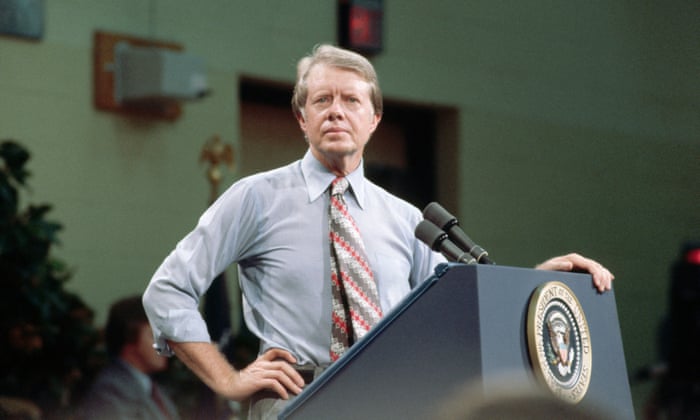
He startled the globe by personally brokering the critical Middle East peace treaty between Anwar Sadat and Menachem Begin at Camp David. He ceded access to the Panama canal, angering conservatives who thought he was giving away an American asset. Through the Alaska National Interest Lands Conservation Act, he doubled the national park system and conserved over 100m acres of land – the most sweeping expansion of conserved land in American history.
He was not afraid to make unpopular moves, or ask for personal sacrifice. He was old-fashioned and a futurist, and nowhere did his futurism matter more, or seem more prescient, than on climate and conservation. He risked speaking directly to the American public, and asking them to do a difficult thing – focus on renewable energy and reduce reliance on oil.
He paid the price for this frank ask, and so did we.
In advance of his trip to Plains, Georgia, Biden participated in a video tribute to Carter, joining an all-star cast of Georgia politicians, the familiar faces of Senator Jon Ossoff, Senator Raphael Warnock and Stacey Abrams serving as an affirming nod to Georgia’s return to political importance.
The messages address the substance of the film, but also serve as a heartfelt thank you to a former president who has only recently begun to look prescient on climate, and singular in his moral bearing.
“He has always lived his values,” Abrams says in the video.
“Our world cries out for moral and ethical leadership,” Warnock offers. “Few have embodied it as clearly and consistently as Carter.”
“He showed us what it means to be a public servant, with an emphasis on servant,” Biden says.
Many Americans can’t help but spot a link between Carter and Biden – who became the first elected official outside of Georgia to support Carter’s bid for the presidency in 1976. Biden’s colleagues decried him as an “exuberant” idealist at the time.
There’s also an increasingly stark comparison between the Carter and the Trump administration.
James Gustave Speth served as the chairman of Carter’s Council on Environmental Quality. As Carter’s chief adviser on environmental matters, Speth helped brief Carter on climate change and direct policy. He finds the contrast between Carter and Trump “striking”.
“People see now that Carter was at a pole,” Speth tells me. “Carter was the opposite of Trump – and everything that people despised about him. Carter had integrity, honesty, candor and a commitment to the public good of all else. Carter was a different man, totally.”
Carter’s vice-president, Walter Mondale, died a month ago at 93, perhaps putting an exclamation mark on the need to expedite overdue praise and understanding. Speth agrees that it would be best to speed up our recognition of Carter. “So many fine things are said over the bodies of the dead,” Speth said. “I’d love to have the recognition occur now.”
Speth is also working on his own book on the Carter administration, that covers the Carter and subsequent administrations on climate and energy and highlights the failure to build on the foundation that Carter laid. His project, soon to be published with MIT, carries a damning title: They Knew.
One of the most profound– even painful – parts of watching documentaries like Carterland is bearing witness to the fact that Carter was right on asking us to drive less, to reduce our dependence on foreign oil, to focus on conservation and renewable energy. Not only was Carter’s vision a path not taken, it was a path mocked. Reagan removed the solar panels from the White House, politicized the environmental movement and painted it as a fringe endeavor.
“Carter was our only president who had a visceral environmental and ecological attachment. That was part of his being,” Speth says. “We had an opportunity in 1980 – but we’ve lost 40 years in the pursuit of a climate-safe path. We can no longer avoid serious and destructive changes, period. That didn’t have to happen.”
I ask Speth why getting Carter’s legacy right matters. First, Speth says, it’s important to recognize the example Carter set for looking ahead, in a culture that prizes soundbites and short-term gains. “Carter was a trained engineer who believed in science,” Speth points out. “He understood things on a global scale, and believed in forecasting. Preparing for the long run is rare in politics.”
Carter’s biographer Alter agrees. “If there is a gene for duty, responsibility and the will to tackle messy problems with little or no potential for political gain,” he writes, “Jimmy Carter was born with it.”
While none of these recent documentaries or biographies seeks to portray Carter as a saint or even politically savvy, they do insist that his presidency was more successful than history has acknowledged, particularly on the energy, conservation and human rights fronts. Still, there are aspects of his single term that will probably remain embedded in his narrative, such as his tenuous relationship with Congress, early catering to segregationists to win votes, and Iran’s hostage crisis.
What can we learn from the shifting narrative around Carter’s presidency?
“You can talk about how Carter was an underrated president,” film-maker Jim Pattiz says. “But can you ask yourself: what qualities do you actually want in a leader? Do you want someone who will challenge you to be better, or speak in catchphrases and not ask much of you?
“This film is a cautionary tale,” Pattiz says. “We can elect another Carter. Let’s reward leaders willing to do the right thing.”
Jason Carter has lived with the nuances and inconsistencies in the narrative surrounding his grandfather’s presidency his entire life. “Stories are always summaries,” he says. “They leave out so much so that we can understand them in simple terms. Public narrative, these days, is so often about politics. It should really be about the great, public problems we’re solving. There’s a difference.
“I don’t want history to be kind to my grandfather,” Jason Carter tells me. “I just want history to be honest.”
4 May 2021
